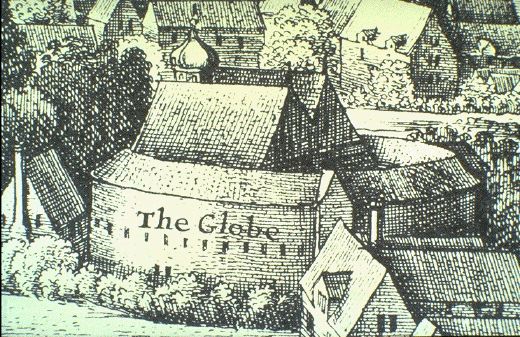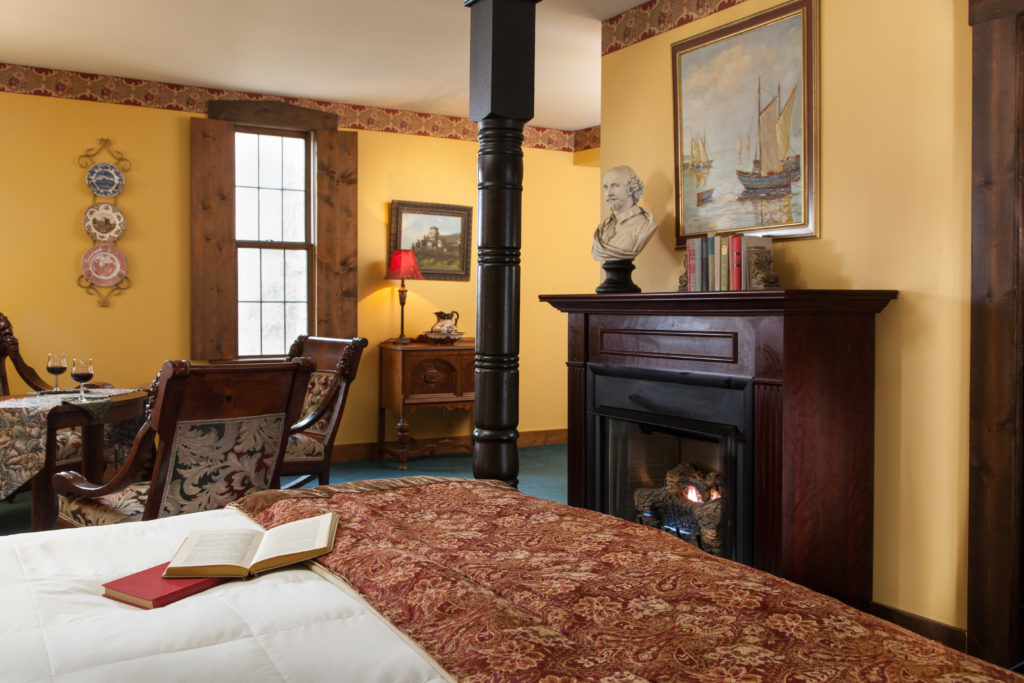
Legends & Lore: Shakespeare
Join us this week on Quoth the Raven as we dive into the story of what (we think) we know about William Shakespeare. Having inspired an entire suite at Ravenwood Castle, we found it fitting to spotlight him as part of our Legends & Lore series. While taking a closer look at the works of the man could easily take up half your day, don’t fret – we won’t be looking into all the details, just focusing on some little-known facts and highlights of his life.
A lot of what we speculate about William Shakespeare’s personal life is a mystery. We can gather that he was born in 1564 in Stratford thanks to an old church record, although no birth records exist. Stratford is located around 100 miles from London and was a bustling market town located near the River Avon during the time William was growing up. To this day, Stratford owes its tourism to the city not only being Shakespeare’s birthplace, but it being his gravesite. Nearly 2.5 million people make their way every year to see his funerary monument – click here to check out what it looks like!
William was one of eight children. His father John had quite a few trades under his belt but is most known for being a leather merchant. At one point, John was actually responsible for inspecting bread and malt liquors which means his father was (essentially) getting compensated for drinking beer. A job I think a lot of us dream of! His mother Mary was the daughter of an affluent landowning farmer. There are very few records of William’s early life and almost none about his education. For this reason, some speculate that his work may not be his own given that we don’t know the history of his schooling – some even go as far to question if Shakespeare ever existed to begin with.
In 1582, William was married at age 18 to a woman by the name of Anne Hathaway, age 26. She had their first child only six months later. In total, Anne bore three children: Susanna and twins, Hamnet and Judith. Unfortunately, the family lost Hamnet at age 11 to unknown causes.
In between the years of 1585 and 1592, often called the “lost years”, William worked on starting what would be his very successful career. There is wide speculation as to what exactly he was doing during this time as there is virtually no information or record of any activity. Some believe he was a horse attendant. Another popular guess is that he might have been working as an assistant schoolmaster in Lancashire, but who is to say? The first time William was mentioned after his twins’ baptism in 1585 was by the playwright Robert Greene. Green denounced William in a pamphlet as an “upstart crow” and this affront suggests he’d already made a name for himself in the London theatre scene.
William was not only a writer, but an actor and was even part-owner of the Lord Chamberlain’s Men. This was a company of actors, most commonly referred to as a “playing company” back in the day, and later it was dubbed the King’s Men when King James ascended to the throne. The company held exclusive rights to perform Shakespeare’s plays and for some time, performed them at The Theatre in Shoreditch. Unfortunately, after running into a problematic landlord, a partnership of members built a new theatre: The Globe Theatre. It is believed that William saw much success with his company and the Globe but as luck would have it, the theatre was later destroyed in a fire in 1613.

By 1597, at age 33, Shakespeare had already published nearly half of the 37 plays he had written. Around this time records show he purchased one of the largest homes in Stratford, called New House, for his family. The New House is a symbol of William’s commercial success in the theatre. And though he may not have been revered during his lifetime, he received attention for his works that changed and influenced our world.
William’s work has made a lasting impression on the arts. For example, until Romeo and Juliet, romance had not been seen as a worthy topic for tragedy. He took the dramatic potential in a story and drew upon its plot, language, and characters to evoke emotions that had been unknown to the theatre prior. Another example is how soliloquies had been used mainly to convey information, but Shakespeare used them to explore characters’ minds. Herman Melville’s soliloquies owe much to Shakespeare – his Captain Ahab in Moby Dick is a classic tragic hero and was inspired by King Lear. And did you know that the popular expression “with bated breath” actually originated from Shakespeare’s Merchant of Venice?
William Shakespeare died at age 52 in 1616. He passed shortly after signing his will in which he referred to himself as being in “perfect health”. About a half century later, the vicar of Stratford wrote that he may have drank too hard and died from a fever he contracted with his two pals one night. This wasn’t immediately ruled out as impossible, as Shakespeare knew both men the vicar listed. His death may be the final mystery of his life, but his plethora of works are still interpreted, performed, and dissected to this very day which makes it is easy to say that his influence on our world and the arts will continue until the end of time.

Need to get away? Or perhaps you’re feeling inspired to feel as well-to-do as Shakespeare himself? Then check out our Shakespeare Suite at the Castle! This is a first floor Castle room and boasts a spacious sitting area with a fireplace, a roomy bathroom with an oversized tub, a cozy king bed, and the best part: only a few steps away from breakfast! Whether you want to get away by yourself for work (we do have wi-fi in the Castle!) or take your loved one away on a romantic weekend, our Shakespeare Suite is sure to provide for an unforgettable stay. See you soon!


 Quoth the Raven
Quoth the Raven